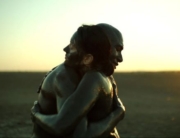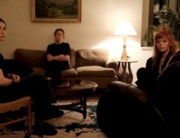
This well-meaning drama kicks off with fairy tale–inspired imagery, including a unicorn and the main protagonist dressed up as Little Red Riding Hood. The latter is apt as the heroine, 12-year-old Alicia Willis (Tayler Buck), frequently runs away from foster homes to Los Angeles’s Skid Row, where she tends to her homeless father, Beaumont “Bo” Willis III (Edi Gathegi). A veteran, he’s disheveled and glassy-eyed, with overgrown hair and an ominously silent demeanor, although in flashbacks he was quite different before suffering a traumatic brain injury while serving in Iraq.
Alicia spends her days and nights caring for her father on the streets, and the film quickly trades in the fantasy aesthetic for grit as helmer Van Maximilian Carlson attempts to underline how dangerous life on the streets can be. Early on, the pair harmlessly take shelter inside an unlocked car in an auto lot, only to be confronted the next day by an employee waving a shotgun in their faces. But the streets aren’t just coldly indifferent, they’re full of Big Bad Wolves looking to potentially hurt or exploit Alicia and her dad. Her only ally, Magdalene (Ana Ortiz), a social worker, sees Alicia’s potential as a budding writer. Though the girl has run away from three homes in six months, Magdalene still wants to place her in a stable environment.
The film follows Alicia to the far-off seaside house of her prospective new guardians, who include John (Martin Sheen), a successful author who was impressed by Alicia’s writing. But she almost immediately bolts, hopping a bus back to LA to try and help her father access his Veterans Administration funds. What follows, rapid-fire, is a chase through a VA building, a squat in an abandoned house that leads to a violent encounter, seeking help from a man who initially appears to be a homeless shelter outreach worker but who turns out to be nefarious, and more fighting and running. Unfortunately, the narrative never slows down long enough to examine the effects of these experiences on Alicia.
Though the story line has its share of twists, neither Carlson nor his co-screenwriter, Alan Shawn Austin, seem capable of foreshadowing, resulting in less-than-satisfying viewing at times. They also toss in subplots that viewers will be able to predict right away, such as the reason why Alicia is the only girl John and his spouse have ever attempted to adopt.
At least the acting is first-rate. The character of Alicia must walk a fine balance between battle-hardened and emotionally vulnerable, as when she pets a real-life horse for the first time. Buck’s physical expressiveness is a boon during scenes in which Alicia is frustrated with her father or angry at those who wish to tear her family apart. However, we might not have empathized with her at all if she weren’t so convincingly joyful during the rare moments when some shred of her old dad returns.
Speaking of her father, Gathegi does incredible work, but he’s let down by a screenplay that increasingly treats him as a walking deus ex machina. Beaumont conveniently has moments of clarity when Alicia needs advice on what to do next, and at one point he turns into a hyper-efficient fighting machine just as his daughter finds herself in hot water and needs rescuing.
Beaumont may be underwritten, but that could be said about nearly every character, including Alicia, who doesn’t quite grow as a person even as a lot of things happen to her. Eventually, she makes a fateful decision regarding her father that theoretically has a profound effect on the rest of her life, but it stems from an incident that could just have easily happened during the first reel; it doesn’t necessarily grow organically out of the film. The exception to this line of complaining might be the social worker, Magdalene, who has a weariness that seems absolutely believable given how much time she spends chasing after Alicia.
The film could have leaned a little more into the fairy tale-like direction hinted at in its bookend scenes, especially since the story is supposed to be told through the eyes of Alicia, who, when she looks at her father, still sees the softer, loving man before he became ill. That more idealized version of Beaumont doesn’t show up often enough, and his absence adds to the feeling that the filmmakers were more concerned about plot than the main protagonist’s highly emotional coming of age. Overall, both Alicia and the viewer deserve better.






Leave A Comment